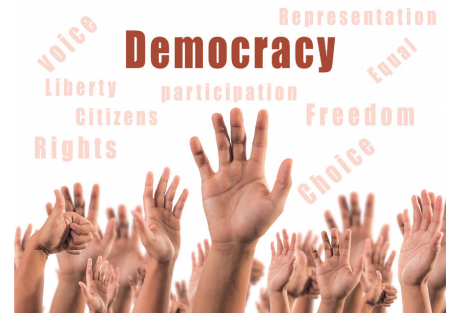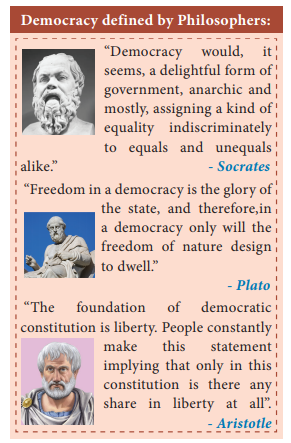Chapter: 11th Political Science : Chapter 5 : Democracy
Definition and types of Democracy
Democracy
Definition and types of Democracy
The term ‘Democracy’ is derived from the Greek word
as demo means people and cracy is referred as rule. The concept of democracy in
its Greek term comes from “demos and “kratos” meaning “people” and “rule”. Thus
the term democracy is Rule by People.
Democracy is one of the most important and well-
debated topics in the world since the beginning of the Twentieth Century and it
has increased importance in the Twenty-first century. Democracy has been
defined in different terms and usage by many philosophers, rulers and scholars
from time to time according to the changes taking place in socio-political and
economic institutions that were there. Democracy encompasses the powerful
concepts of Rights, Freedom defined in Liberty, Equality and Fraternity all
religions.
The concept and practice of Democracy in the Modern
period evolved in Britain, although it’s ancient concept and practice was in
Ancient Greece.

Democracy is based on the type of the social system
of the country or nation. The social system determines the type and working of
democracy. Democracy is important for creating Liberty and Equality that are
adopted to bring equality in the unequal society based on political and
institutional mechanisms. Democracy has become the most popular form of
government and universally regarded as a meaningful political concept in the
world in the present period.
The spread of Democracy in began in the world in
different countries from the beginning of the Twentieth-century.

As a concept and a system of government, Democracy is an
instrument of expression of free speech.
Characteristics of Democracy
a.
Democracy is a set of principles
and practices that protect human freedom.
b.
Democracy rests upon the
principles of majority rule, along with individual and minority rights.
c.
Democracies as a system guard
against all-powerful central governments and it decentralizes government to
regional and local levels. The right of the people to demand the Government
they elected and the duty of the Government to be accessible and responsive to
their needs and demands is the main function.
d.
One of the primary functions of
Democracies is to protect such basic Human Rights i) Equality before Law, ii)
Equal Protection before Law iii) Freedom of Speech, iv) Freedom of Religion;
vii) Right to organize and participate fully in the political, economic, and
cultural life of society.
e.
Democracies conduct regular free and
fair elections open to all citizens.
f.
Democracy subjects governments to
the Rule of Law and it ensures that all citizens receive equal protection under
the law and that their rights are protected by the Legal-constitutional system.
g.
Democracies are diverse political
systems, reflecting each nation’s unique political, social, and cultural life.
h. Democracy
ensures the citizens to participate in the political system and it protects
their rights and freedoms.
i. Democratic
societies are committed to the values of tolerance, cooperation, and consensus.
j. In the
words of Mahatma Gandhi, “intolerance is itself a form of violence and an
obstacle to the growth of a true democratic spirit.”
k. Democracy
is a system of government in which power and civic responsibility are exercised
by all citizens, directly or through their freely elected representatives.
![]()
Democracy underlines the Principle of Rule by the
people. It ensures a form of government in which all the citizens of a nation
determine public policy, the laws, and the actions of their state together
either in a Direct Democracy or by Representative Democracy. Democracy ensures
that all citizens have an equal opportunity to express their opinion. Democracy
is generally defined as “government by the people; that form of government in
which the sovereign power resides in the people as a whole, and is exercised
either directly by them or by officers elected by them.”
Types of Democracy
Democracy by its function has different scope and
importance.
i)
Political Democracy
ii)
Social Democracy
iii)
Industrial Democracy
iv)
Economic Democracy
v)
Totalitarian Democracy
vi)
Radical Democracy
vii) Plebiscitary
Democracy
i. Political Democracy
Political democracy feature's the popular
participation of citizens in government by which citizens elect their
representatives to the Legislature of the state. The elected representatives
are accountable to the citizens who elected them. As a political system of
government, Democracy works either as a function by the direct involvement of
the citizens in making laws and the elected legislators would introduce it in
the Legislature. This is known as the process of Popular Initiative. Similarly,
when the legislators elected by the people frame legislation, it is approved by
a popular vote that is based on popular acceptance of the laws. This is known
as Popular Referendum.
The second type of Democracy is the Representative
system of Democracy in which the elected representatives of the people
(representative democracy)are elected for a term of office who determine public
policy on behalf of the people. Political Democracy by Representative system of
democracy is the dominant form of Democracy all over the world, whereas the
Direct Democracy is practiced in the Federal Republic of Switzerland.
ii. Social Democracy
Social Democracy is a combination of social,
economic and political ideas that supports economic and social policies. It
promotes social equality and social justice giving strength to economy and
representative and participatory democracy. Social Democracy is based on the
principle of Social equality in all aspects of gender, status, beliefs, values
and customs. Alexis De` Tocqueville the eminent French
thinker praised the American political system as one of the true
democracies as it did not believe and encourage feudalism.
Social Democracy believes strongly in Equality of
opportunity and equality in freedom as the basis of human rights and life in a
Democracy. Social Democracy enabled the individual through hard work and effort
to succeed and excel.
Social Democracy believed in the progress of
equality as progress of liberty and the progress of liberty as the greatest
progress of Democracy in a state.
iii.Industrial Democracy
Industrial democracy is defined as the means to
promote democratic principles in industry and labour by the provision and
protection of Labour Rights and Responsibilities in the workplace.
Industrial democracy encourages the participation
of labour in decision making along with the management. Industrial democracy
promotes dignity and decency of labour and paves way for better efficiency,
harmony and unity of purposes of the management and labour.
Industrial democracy enables the workers
participate actively in the process of building both community and individual
interests for the collective good of the society and state.
Industrial democracy empowers workers as partners
in the industry calling for their joint efforts to build community interests
and welfare
Industrial democracy paves for the development and
growth of the country through better productivity and greater harmony
iv. Economic Democracy
Economic democracy is defined as the process of
creating democratic conditions of economic productivity, minimising the
rich-poor gap and socio-economic differences, promoting affordable economic
development and the ideal of creating greater equality among various classes.
Economic democracy believes in “workplace
democracy” and “employee ownership” that is intended to promote equality and
democratic redistribution of wealth.
Economic democracy believes in the ability of the
social system to integrate and society and economy for the betterment of human
economic freedom and dignity. Economic democracy believes in social welfare and
development as priority. and decency of labour and paves way for better
efficiency, harmony and unity of purposes of the management and labour.
Industrial democracy enables the workers
participate actively in the process of building both community and individual
interests for the collective good of the society and state.
Industrial democracy empowers workers as partners
in the industry calling for their joint efforts to build community interests
and welfare
Industrial democracy paves for the development and
growth of the country through better productivity and greater harmony
iv. Economic Democracy
Economic democracy is defined as the process of
creating democratic conditions of economic productivity, minimising the
rich-poor gap and socio-economic differences, promoting affordable economic
development and the ideal of creating greater equality among various classes.
Economic democracy believes in “workplace
democracy” and “employee ownership” that is intended to promote equality and
democratic redistribution of wealth.
Economic democracy believes in the ability of the
social system to integrate and society and economy for the betterment of human
economic freedom and dignity. Economic democracy believes in social welfare and
development as priority. Economic democracy is based on the importance of economic
rights and social equality.
v. Totalitarian Democracy
Totalitarian Democracy is known as populist democracy or mass democracy in which Citizens after electing the representatives have no voice in decision-making, but the elected representatives decide for the entire country. Totalitarian Democracy elevates the ruler, party and the elected legislators over the voting citizens and captures power through democratic means but runs as dictatorship. The political ideology of the ruler, party and the legislators becomes dominant over people interests. Totalitarian democracy in the name of people’s rights would use internal terror against certain sections of people and also speech restrictions to keep the population under its complete control.
Totalitarian democracy would have complete control
of the economy of the state and would use it to control the population.
vi. Radical Democracy
Radical Democracy was proposed by M.N.Roy a leading
Indian political thinker who believed in “real rule” of the people for the term
of office to which the legislators are elected. Radical democracy supports the
idea of direct accountability of the legislators and executive to the people
during the term of office. Radical Democracy believed in the humanism of the
people who are the real masters of political authority and power and not the
elected legislators.
Radical Democracy believed in the “power of the
people” in local communities known as local republics who would join in the
creation of the state and government. The local republics would finally
exercise authority in the national and state levels.
Radical democracy brings into Democracy the real
sense of people’s participation, accountability of the elected and the power of
the people to change the government.
vii. Plebiscitary Democracy
Plebiscitary Democracy is defined as the process of
a direct voting by the people of a candidate, or party or a public issue or the
adoption of a new constitution of a state or to determine the association of
the province with the state known as national self-determination. The voters
have the choice to accept or reject the choice.
Plebiscitary democracy gives the citizens the right
and power to collect a sizeable number of signatures on a petition to draft a
law or a public policy programme and put the proposal or draft law to vote by
the citizen population
Plebiscitary democracy can by a collection of
signatures could result in the recall of the elected representative because of
failure to represent the real interests of the people.
Related Topics